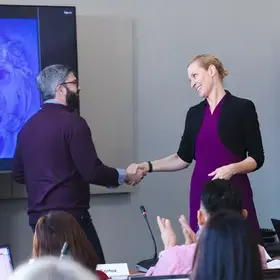Dr. Maya Dahan, MDCM, FRCPC, FAAP, a current student in Columbia University’s M.S. in Bioethics program, recently co-wrote an op-ed in the Lancet Child & Adolescent Health Journal, an international publication with a clinical focus that features the latest research promoting the health of children. The article, “Neonatal Research Outcomes: The Ethical Imperative to Change Attitudes,” discusses how the current method of evaluation of long-term newborn outcomes is unethical.
While in Dr. Robert Klitzman’s class, Research Ethics, Dr. Dahan began writing this article. She recently finished her Neonatal-Perinatal Fellowship at the University of Toronto, and now continues there as an attending neonatologist and assistant professor. She is continuing her master’s degree at Columbia in parallel.
Dr. Dahan states that more research focused on classifying and assessing function, instead of disability and deficits, is needed. This can help provide better practical information to both families and providers. The article posits that one of the problems that research faces is that clinicians, like all humans, are susceptible to bias. How these biases impact a healthcare provider’s interpretation of an outcome can shift a life-or-death decision. The study questions how biases affect the way research is interpreted and how the research in turn affects parental counseling. Ultimately the article suggests a different approach: one that is focused on function as opposed to deficits.
Dr. Rudaina Banihani and Dr. Paige Terrien Church, both mentors of Dr. Dahan’s at University of Toronto’s Department of Pediatrics, co-authored the article with her. The article highlights three specific aspects of neonatal outcome research that can influence decision-making within the neonatal intensive care unit. "Framing bias" focuses on the negative way an outcome can be described, such as “infants having severe neurodevelopmental impairment,” instead of focusing on the function that infant retains. "Dichotomous outcomes" perpetuate a bias that presents an outcome as all or nothing, either/or, disabled or able, developmentally impaired or not. And finally "composite outcomes" present death and disability in such a way that they seem equal. Together, these “three notions constitute the microethics of long-term outcome research and perpetuate ableism.”
Which class did you take with Dr. Klitzman, and which topics did you study? How did they inspire your Neonatal Research Outcomes piece?
I wrote this piece as my final paper for my Research Ethics class, one of the core classes for my Master’s in Bioethics. I wanted to write a piece that was relevant to my day-to-day work in neonatology. Throughout that first semester, my classes pushed me to question whether certain things that had always been done a certain way were necessarily ethical. Through discussion with my mentors in neonatology, we came up with this topic that incorporated neonatology, research ethics, and my own interest in cognitive biases.
What advice would you give current or prospective M.S. in Bioethics students who are considering a similar career path to yours?
I would suggest writing papers that are of interest to you, as it allows you to explore a topic within your field with a different lens. I would also suggest keeping an open mind and learning from the professors and other students, as everyone starts the class with different lenses and lived experiences. I have learned as much—if not more—from the people I have met than from the assigned readings.
Tell us about your experience in the Bioethics program. What did you find most valuable about the program? How are you applying what you learned from the program in your work?
I am loving my experience so far in the program! Coming from a medical training background, most things are algorithmic and mathematical. Being part of this program has helped me open my mind to various perspectives, and provided me with a structure to approach ethical problems. It has not only helped me in my academic and professional life but is also helping me become a more reflective person.
Learn more about the Bioethics program here.


